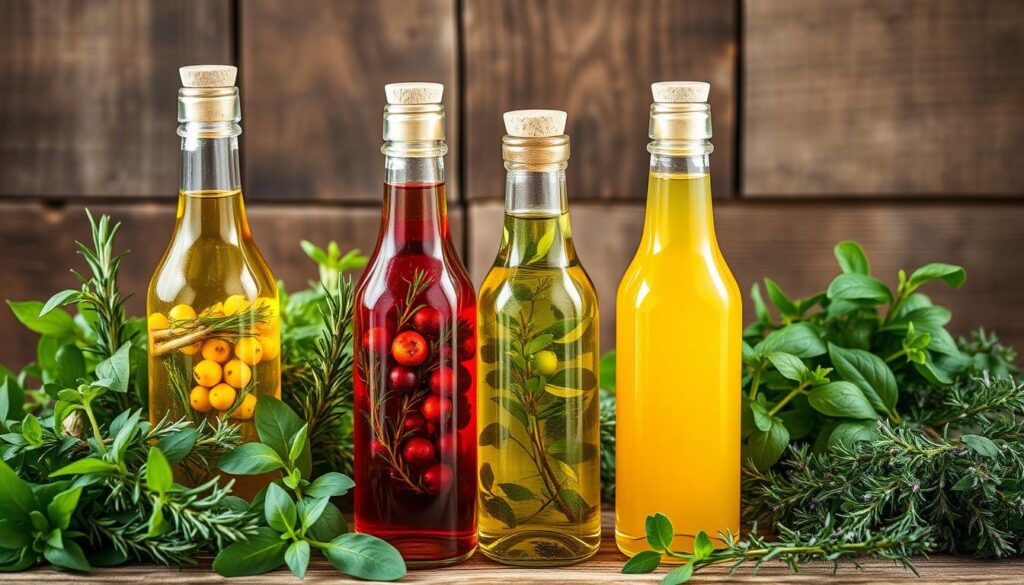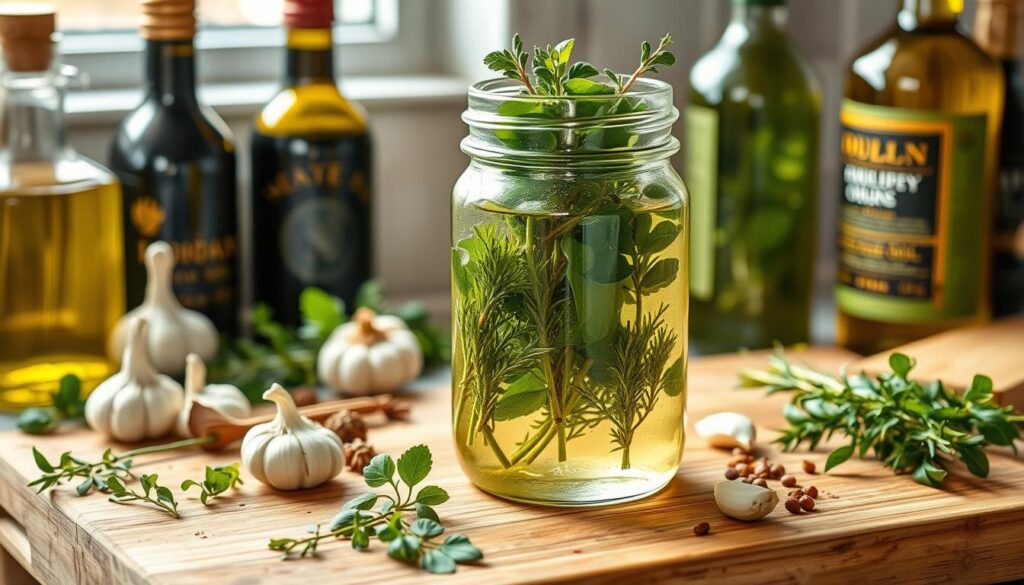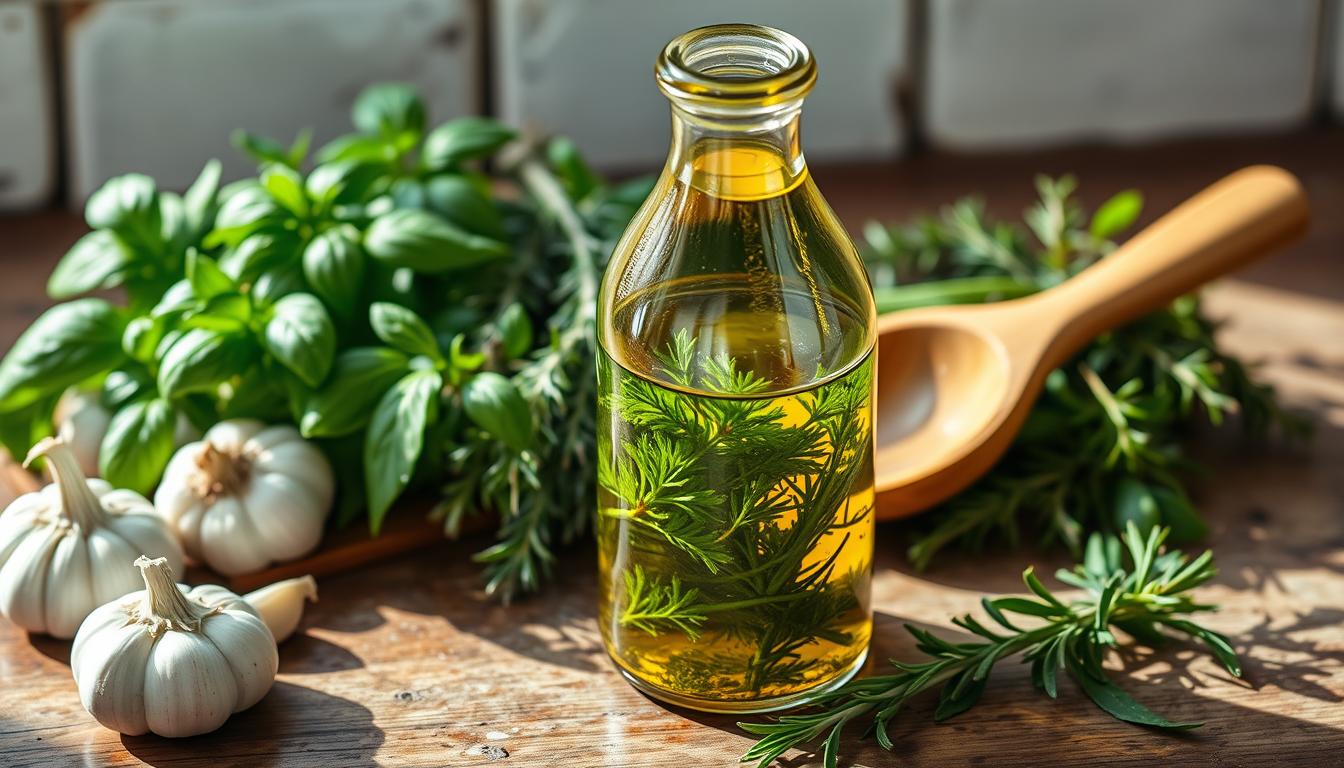This post contains affiliate links.
Ready to take your cooking to the next level? Let’s explore herb-infused oils! These oils add a burst of flavor to any dish. They’re perfect for both experienced chefs and beginners.
Imagine drizzling basil-infused olive oil over garlic Parmesan roasted broccoli. Your veggies will go from ordinary to amazing! Herb-infused oils make simple meals into unforgettable dishes.
But there’s more to it. Herb-infused oil is also great for your health. It combines the benefits of herbs with a tasty, easy-to-use format. It’s also a smart way to use up fresh herbs from your garden.
Ready to start a flavorful adventure? Put on your apron and let’s infuse! Your taste buds and dinner guests will love it.
Key Takeaways
- Herb-infused oils add depth and flavor to dishes
- Popular herbs for infusion include basil, rosemary, and oregano
- Olive and canola oils are recommended for infusions
- Homemade infused oils typically last 2-3 months
- Proper storage in amber glass containers preserves freshness
- Quick infusion method takes 1-2 hours, while sun method takes 2-3 weeks
- Labeling with a “use by” date is important for safety
What is Herb-infused Oil?
Herb-infused oil is a culinary gem that elevates your cooking game. You create these flavorful concoctions by soaking herbs in carrier oils. This extracts their essence and beneficial compounds. The result? A potent blend that packs a punch in both taste and health benefits.
Definition and Basic Concept
Imagine your favorite olive oil, but with an herbal twist. That’s the essence of infused olive oil. You’re essentially marrying the goodness of herbs with the smooth richness of oil. It’s like giving your oil a flavor makeover!
Types of Herbs Commonly Used
Your herb garden is a treasure trove for creating flavored oil blends. Popular choices include:
- Basil
- Rosemary
- Thyme
- Oregano
- Garlic
- Mint
Benefits of Using Herb-infused Oils in Cooking
Why bother with herb-infused oils? Well, they’re not just a pretty face in your kitchen. These oils pack a flavorful punch and offer potential health perks. Plus, they’re versatile enough to jazz up everything from salads to roasts.
| Benefit | Description |
|---|---|
| Flavor Boost | Adds depth and complexity to dishes |
| Health Perks | May offer antioxidant and anti-inflammatory properties |
| Versatility | Use in cooking, as dressings, or for finishing dishes |
| Shelf Life | Can last up to a year with proper storage |
Ready to dive into the world of essential oil infusions? It’s time to unleash your inner chef and create some magical flavored oil blends!
Choosing the Right Oil for Infusion
Choosing the right oil for your infused oils is key. The right oil can make your food taste better and be healthier. Let’s look at some popular oils and what to think about when making your own.
Popular Oil Options
Some oils are better for making infused oils:
- Olive oil: It has a rich taste and is versatile.
- Grapeseed oil: It’s light and absorbs well.
- Avocado oil: It has a high smoke point, great for cooking.
Factors to Consider
Think about these when picking an oil:
- Flavor profile: Pick an oil that goes well with your herbs.
- Smoke point: Choose a higher smoke point for cooking.
- Intended use: Is it for dipping, cooking, or drizzling?
Health Benefits of Different Oils
Each oil has its own health benefits:
| Oil Type | Key Benefits | Nutrient Profile |
|---|---|---|
| Olive Oil | Boosts the immune system | Rich in monounsaturated fats |
| Grapeseed Oil | Raises HDL cholesterol | High in polyunsaturated fats |
| Avocado Oil | Lowers LDL cholesterol | Contains monounsaturated fats |
The oil you pick is the base of your infused oils. By thinking about these points, you’ll make oils that taste good and are healthy.

Essential Equipment for Making Herb-infused Oil
Ready to start making your own herb-infused oil? You’ll need some basic tools. It’s a fun and rewarding process that can make your cooking better.
First, get glass containers with tight lids. They’re great for keeping your oil infusions fresh. Next, you’ll need a double boiler or two saucepans for the warm infusion method. This method extracts herbal goodness in just a couple of hours at 100 degrees Fahrenheit.
Also, have a cheesecloth or fine mesh strainer ready to separate the herbs from the oil. Make sure to use sterilized jars for safe storage. If you prefer sun infusion, find a sunny spot for your jar.
Want to improve your process? Consider a sous-vide Precision Cooker. It costs $94 on Amazon and is a great investment for those who love herb-infused oil. This method takes about a week but gives amazing results.
| Equipment | Purpose | Approximate Cost |
|---|---|---|
| Glass containers | Storage | $10-$20 |
| Double boiler | Warm infusion | $20-$40 |
| Cheesecloth | Straining | $5-$10 |
| Sous-vide Cooker | Precision infusion | $94 |
With these tools, you’re ready to make delicious herb-infused oils that last up to 6 months. Happy infusing!
Step-by-Step Guide to Creating Herb-infused Oil
Ready to start a flavorful journey? Let’s explore making your own herbal oils. This guide will show you how to create aromatic herb oils for your dishes.
Preparing Herbs and Oil
First, pick your favorite herbs and a good carrier oil. Clean and dry your herbs well. For fresh herbs, let them wilt for 12 hours to get rid of extra moisture. Use high-quality oils like olive, grapeseed, or avocado for your blends.
The Quick Method: Stovetop Infusion
Need it fast? Try the stovetop infusion. Heat your oil to 100°F and add herbs. Infuse for 1-2 hours, stirring now and then. This method is great for those who want to use their oils quickly.
The Sun Method: Slow Infusion Process
For a traditional way, use the sun method. Put herbs and oil in a clear jar and place it in the sun for 2-3 weeks. This slow method lets flavors fully develop, making rich, aromatic oils.
Straining and Storing Your Infused Oil
After infusing, strain your oil through cheesecloth or a fine mesh. Store it in a sterilized glass jar, away from sunlight. Stored right, your oils can last months.

| Infusion Method | Time Required | Best For |
|---|---|---|
| Stovetop | 1-2 hours | Quick results |
| Sun | 2-3 weeks | Rich flavors |
| Traditional | 4-6 weeks | Deep infusion |
Quality ingredients and patience are key for great herb-infused oils. Happy infusing!
Safety Precautions and Best Practices
Creating natural herb-infused culinary oils is a fun culinary journey. But, safety is key. Let’s explore some important steps to keep your infused olive oil tasty and safe.
Always use dried or wilted herbs for infusions. This step stops mold from growing, which can ruin your oil. If you dare to use fresh herbs or garlic, acidifying them is crucial. Soak them in a 3% citric acid solution first. This helps prevent botulism, a serious foodborne illness.
Here’s a quick guide for acidifying herbs:
- Garlic: 1 part garlic to 3 parts citric acid solution
- Basil, oregano, rosemary: 1 part herb to 10 parts citric acid solution
- Soak for 24 hours before infusing
After making your infused olive oil, storing it right is essential. Use clean, food-grade containers and mark them with the date. Keep your oils cold and use them within 2-3 months. Always check the smell before using – if it smells bad, don’t use it!
Enjoying your homemade infused oils should never risk your safety. By following these tips, you’ll make delicious and safe oils. These will take your cooking to exciting new levels.
Culinary Uses for Herb-infused Oil
Ready to take your cooking to the next level? Artisanal infused oils are your secret ingredient. These botanical oil extracts add a burst of flavor that turns simple dishes into masterpieces.
Enhancing Salad Dressings and Marinades
Want to make your salads pop? Just drizzle some herb-infused oil on top. Mix it with vinegar for a zesty dressing. Marinate meats in these oils for a herby flavor before grilling.
Drizzling Over Finished Dishes
Just plated your dish? Add the final touch with herb-infused oil. It elevates pasta, bread, and even roasted veggies. A simple drizzle can make a big difference.
Incorporating into Sauces and Dips
Looking to spice up your sauces? Add herb-infused oil to mayo or aioli. Use it for pesto or chimichurri. It can even make hummus a hit at your next gathering.
“Herb-infused oils are like magic wands for your kitchen. They can turn the simplest dish into something spectacular with just a few drops.”
Using herb-infused oils in cooking is all about creativity. So, don’t be afraid to try new things. Let your imagination run wild in the kitchen!
Popular Herb and Oil Combinations
Ready to spice up your kitchen game? Let’s explore the world of herbal oils and flavored oil blends. You’ll find some amazing combinations that will make your taste buds dance!
The classic rosemary and olive oil duo is a must-try. It’s perfect for roasting potatoes or drizzling over focaccia. For a lighter touch, basil and grapeseed oil is a great choice. It’s perfect for salads!
Garlic lovers, rejoice! Garlic-infused olive oil is a kitchen essential. It’s great for sautéing veggies or as a bread dip. Try thyme and avocado oil for a surprising twist. It’s amazing on grilled fish.
| Herb | Oil | Best Used For |
|---|---|---|
| Rosemary | Olive | Roasting, bread dipping |
| Basil | Grapeseed | Salad dressings, pasta |
| Garlic | Olive | Sautéing, marinades |
| Thyme | Avocado | Grilling, seafood dishes |
Want a zesty kick? Citrus peels are great with lighter oils like sunflower. Imagine lemon-infused oil on grilled chicken – yum! Mint and olive oil is also a refreshing twist. It’s versatile and perfect for Middle Eastern dishes.
Creating aromatic herb oils is all about experimenting. Mix and match to find your perfect flavor. Who knows? You might just invent the next big thing in cooking!
Herb-infused Oil: A Flavor Boost for Cooking
Ready to elevate your cooking? Herb-infused oils are your secret ingredient! These oils add a burst of flavor that will excite your taste buds. Just a drizzle can turn a simple dish into a masterpiece.
How herb-infused oils enhance flavor profiles
Herb-infused oils bring depth to your dishes easily. They add herbal notes or bold flavors, depending on the herbs used. For example, rosemary oil can make a roast chicken special, and garlic oil can make pasta taste gourmet.
Experimenting with different herb combinations
Explore the world of herb-infused oils! Mix herbs to create unique flavors. Try basil and thyme for a Mediterranean taste or sage and oregano for an Italian touch. These oils can last up to a year, giving you time to experiment.
Tips for balancing flavors in your dishes
Start with a small amount of herb-infused oil and adjust as needed. Consider how the oil will mix with other ingredients. For instance, a light lemon-thyme oil is great with fish, while a strong rosemary-garlic oil suits steak. Aim to enhance, not overwhelm. With these tips, your meals will be full of flavor and everyone will want more!
FAQ
What is herb-infused oil, and why should I use it?
What are some popular herbs and oils used for infusion?
How do I make herb-infused oil at home?
What safety precautions should I take when making herb-infused oil?
How can I incorporate herb-infused oil into my cooking?
This post contains affiliate links.

